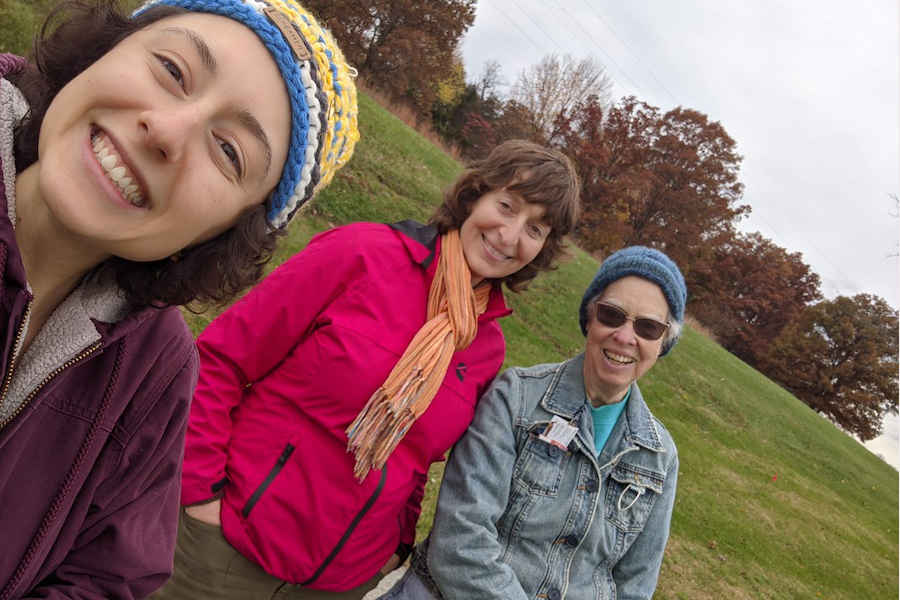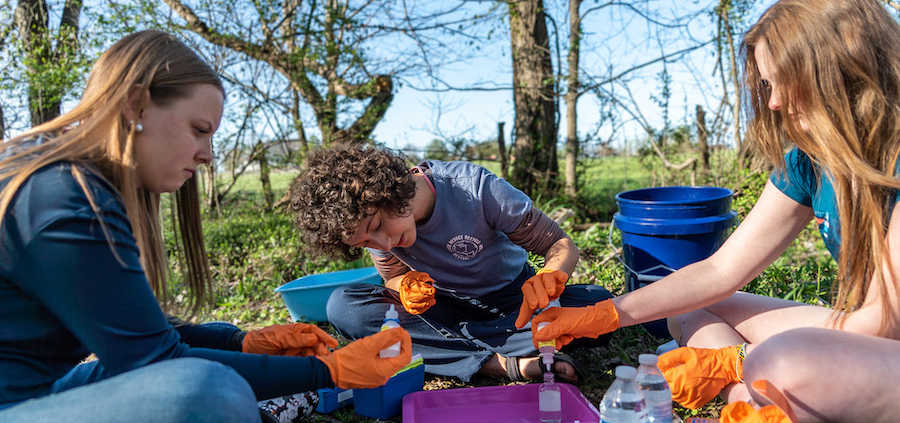The World I’ll Inherit: Climate Change and the Laudato Si’ Action Platform by Julia Gerwe
I’m acutely aware of the fact that the world I’ll inherit is burning.
My two years of service as an ecological sustainability–focused AmeriCorps volunteer with the Sisters of Charity of Nazareth have exposed me to the striking reality that our world is in crisis—and likely reaching a tipping point, as Dr. Kimberly Nicholas explains in her readable and riveting introduction to today’s climate catastrophe, Under the Sky We Make: How to Be Human in a Warming World.
Despite icebergs melting, sea levels rising, and living amidst the worst mass species extinction since the loss of the dinosaurs, I have hope. My hope is derived from action I see and am a part of, a cue I’ve taken from youth climate activist Greta Thunberg, who shared in November 2018: “Once we start to act, hope is everywhere. So instead of looking for hope, look for action. Then, and only then, hope will come.”
In my work, I find hope in the form of a congregation of women religious committing themselves to reducing their carbon emissions to zero. I also find hope in re-connecting youth and adults alike to the world around them, such as through a Stream Team collaborative I’ve recently launched in Nelson County, Kentucky, that helps area residents learn about their local watersheds. Action begets hope in these ways.
I also find hope in spirituality. I recently wrote a reflection dissecting my faith and the distance I have felt between my between my passion for justice and the Catholicism I have known. I would be remiss to not include my frustration with the Catholic Church’s stalled action on climate change, which disproportionately affects the already poor and marginalized, within this scope.
However, this Easter season of rejoicing bears witness to the ongoing, uplifting efforts of the recently launched Laudato Si’ Action Platform, “a journey towards full sustainability in the holistic spirit of integral ecology,” within the Catholic Church.
The Laudato Si’ Action Platform (LSAP), launched five years after the publication of Pope Francis’s encyclical Laudato Si’, is a program by the Vatican’s Dicastery for Promoting Integral Human Development that seeks to actualize Pope Francis’s vision set forth in Laudato Si’, explains Ann Scholz, SSND, Associate Director for Social Mission with the Leadership Conference of Women Religious, a partner in rolling out the LSAP.
The LSAP is essentially a network comprised of seven sectors (families, parishes and dioceses, educational institutions, healthcare institutions, organizations and groups, economic sectors, and religious congregations) aspiring to address seven goals (response to the cry of the Earth, response to the cry of the poor, ecological economics, adoption of sustainable lifestyles, ecological education, ecological spirituality, and community resilience and empowerment) over a period of seven years.
Sr. Ann further describes a major objective of the platform as the “transformation of minds and hearts so that behavior changes and, as a result, we begin to [collectively] change the structures that are so destructive toward the planet.”
This is a monumental task, facing a monumental crisis. Do you see the potential for monumental action and hope? I do, and Sr. Ann does, too, sharing that one of the biggest successes to date is “the gathering of a community of travelers who are willing to take the journey.”
The LSAP certainly will be an ongoing process, as mobilizing and empowering across seven sectors doesn’t happen overnight. The timing is appropriate, as the world now holds its breath to see if planetary warming can be limited to 1.5 degrees Celsius. It’s truly “now or never,” and even from the outside, it’s exciting to see that the Catholic Church is in the fight.
Paz Artaza-Regan, Program Manager of Care Creation Teams with the Catholic Climate Covenant, another critical partner rolling out the LSAP in the US, shares that her dream for the platform is that it reflects this growing urgency and excitement: a vision of the world taking notice of the Catholic community stepping up on climate action.
In order to attain this vision, a renewed emphasis on eco-spirituality within the church is necessary. Both Paz and Sr. Ann note the importance of spirituality as foundational to the success of the platform. Reminiscent of Thomas Berry’s “religio-scientific cosmology for our age,” as J. Milburn Thompson described it in his review of a 2019 Berry biography, the LSAP calls us in as co-creators of our world, interconnected with all of creation. When we recognize ourselves as integrally part of the world, the journey towards the LSAP goal of “ecological spirituality” grounds our work and all other goals, explains Sr. Ann.

From left to right: Julia Gerwe, Carolyn Cromer, and Rosemarie Kirwan, SCN, pause for a photo while planting milkweed seeds on the property of the Sisters of Charity of Nazareth. Planting this important, native plant is a meditative practice that re-connects us to the Earth and the other species that call her home. (Photo courtesy of Julia Gerwe)
To Paz, the LSAP further represents “eco-spirituality come to life”—the recognition that we, as human beings, are part of this integral network of the world. Paz reflects that “It’s really all about realizing that what I do has an impact, whether good or bad.” Educational materials and resources shared through LSAP’s campaign in the US under the name We’re All Part of God’s Plan(et) link spiritual reflection and action.
The LSAP lays the foundation for integral ecology and global action across fields, communities, and generations. All are invited. You are invited! The commitments of individuals, families, communities, and parishes will be integral in driving the success of this program. It is from this grassroots level that ecological spirituality will take root and push this initiative—and, by extension, the global church—forward. Through the LSAP’s diverse range of targeted sectors, there are various ways for everyone to get involved:
- Individuals and families are invited to enroll in this sustainability journey, assessing and reimagining their lifestyles in the process. The We’re All Part of God’s Plan(et) campaign provides resources, stories of action, and events for individuals to engage with each other and the wider LSAP community.
- Individuals are encouraged to continue engaging communities within their circles of influence by bringing parishes, schools, businesses, and other organizations into the LSAP journey. Reiterating the adage that “together, we achieve more,” Paz highlights the importance of making connections and inspiring greater awareness by bringing this program to these external communities. Collectively, the Catholic Climate Covenant and the We’re All Part of God’s Plan(et) program provide resources to bridge these connections.
- Individuals and communities can seek out other parishes and dioceses that have begun to implement the LSAP for guidance, suggestions for actions, and fundraising, communication, and educational strategies. For instance, the Archdiocese of Washington has issued a very helpful overview of their planned seven-year LSAP journey.
Whatever form your action takes, Paz reaffirms that “you have a way to change what’s happening in your backyard.” In our backyards, and in backyards all around the world, the call could not be more clear: The time is now, and it is up to us to act. As people of faith, we owe it to more than just ourselves to find the courage to jump in. ♦
Julia Gerwe (she/her—what’s this?) is an AmeriCorps volunteer, serving in ecological sustainability alongside the Sisters of Charity of Nazareth through the Notre Dame Mission Volunteers. She loves to dance, run, craft, and write, which she has recently found to be an excellent pathway between her reflective musings and pursuit for justice in the world. Connect with Julia here.





Great article Julia! 🙂